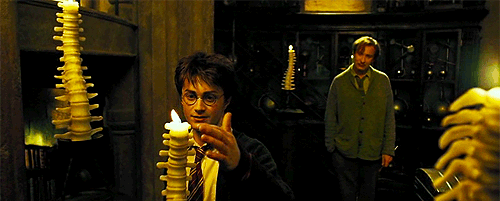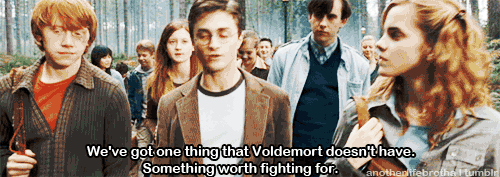Friendship: Lessons from “Harry Potter”
Relationships, like the staircases at Hogwarts, change. They particularly change as we get older, and the way we make and value friendships is a process that undergoes something of a transformation between childhood and adulthood. Thankfully, as it usually does, Harry Potter offers guidance on how to manage that transition while also serving as a reminder of how important those friendships are.
We get to see the most growing pains in Harry’s friendships with Ron and Hermione. Best friends formed young can be extremely influential in terms of growth, exploration, and connection. But sometimes, it’s difficult to make that transition from childhood and teenhood to adulthood when each of your worlds broadens and you find yourself spending less and less time together.
In the beginning, Harry, Ron, and Hermione rarely fight, or if they do, it’s in a sweet way that doesn’t last. By the time Harry Potter and the Deathly Hallows comes around however, the three have gone through some serious struggles. When Ron left the other two, it wasn’t over a small squabble – the stakes were high, and the challenges were seemingly insurmountable. He struggled with issues many of us have struggled with at points in our lives. But these are important moments that Rowling chose to include – friendships are difficult, particularly the ones between people who’ve watched each other grow from child to adult.
Many people who were close with Lily and James Potter come in and out of Harry’s life, and Harry gains invaluable insight from being close with people at different stages in life than himself. While some of these people fill the role of parent at different points – Sirius in particular – it’s also clear that they come to care for him as a friend.
Hagrid and Harry have a particularly unique relationship where they often find themselves caring for one another at low moments. Hagrid opened the first door from the Muggle world to the magical one for Harry, but Harry himself has been a source of reason, reassurance, and tough love for Hagrid over the years. Whether it was with the whole Norbert situation, when Rita Skeeter ostracised Hagrid for his parentage, or when Grawp arrived on the scene, Harry was there.
Harry’s relationships with people like Tonks, Bill Weasley, and Mad-Eye Moody – people who never really stepped into the parent role like Hagrid, Sirius, or Lupin – were likewise enriching in the wide range of perspectives they brought to his life. Tonks – in some ways – was the most similar to Harry (in career choices at least), but her carefree, bubbly personality was something Harry hadn’t seen in someone older than him before. Harry was a serious guy, even at 11, and faced some serious tasks. People like Tonks who looked at life so differently from him gave him a window into a future he’d maybe never considered.
And finally, one of the most insightful transitions that Harry manages throughout the books is with people he once saw as parents. The most significant people on this list would be Lupin, Hagrid, and Dumbledore – with honorable mentions to Professor McGonagall, Arthur and Molly Weasley, and Sirus Black (had he survived).
Whatever Harry and Lupin’s relationship was – parent and child, teacher and student – it broke in Deathly Hallows when Lupin offered his services, and Harry scathingly rejected them. Lupin’s forgiveness of Harry – “I’d tell him to follow his instincts, which are good and nearly always right” (DH 441) – and his choice to make Harry godfather of Teddy prove that not only were the pair reconciled but they’d forged a new relationship built on mutual trust and respect.
And while Harry and Dumbledore’s relationship merits its own article (or ten) to unpack, it’s no secret that in Dumbledore’s public fall from grace, Harry’s feelings about him change irrevocably. But for all the ways he struggles to forgive Dumbledore, to trust him despite his secrecy, Harry ends the book looking at Dumbledore as a friend. I think that this is an extremely transferrable lesson. Harry’s not alone in reaching a stage of adulthood and realizing that the people he looked up to are flawed creatures. Traditional parents, just like Harry’s untraditional ones, are imperfect, and coming to terms with that can be a difficult thing to do. Learning to forgive them for their mistakes – or at least reaching a modicum of understanding – makes for a deeper, more fulfilling relationship.
The ultimate lesson that Rowling teaches us in Harry Potter is that relationships are hard. Maintaining friendships as we grow can be difficult to do. But we all have something to teach each other, and we all have something to learn, so bearing with the struggles and the growing pains ultimately makes our lives better, richer, and more magical.





